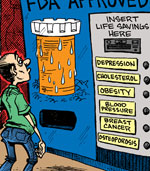Can You Overdose on Vitamin C?
| Share on Facebook | Share on Twitter | Share on Google+ |
Vitamin C is the best known and most commonly taken of all nutritional supplements. People take it because they know it works for colds, flu, and common infections, and because there is good scientific evidence that vitamin C will also help support recovery to good health in people who have high blood pressure, high cholesterol, type 2 diabetes, and cancer risk factors.
But it's always possible to get too much of a good thing. Even with vitamin C, it's possible to overdose.
Too Many Vitamin C Pills for Good Nutrition
The most common drawback to taking too much vitamin C is not to be found on some long list of vitamin C side effects. The most common problem with vitamin C overdose is just that your body cannot use it.
Humans, unless most animals, can't make vitamin C or store it in appreciable quantities. At any given time, the tissues in the human body only hold about 350 to 400 mg of vitamin C. The bloodstream can carry 100 to 200 mg more, but this vitamin C is used or breaks down very quickly. About half the vitamin C your body absorbs from food or supplements disappears from circulation in just 30 to 90 minutes. Even if you take a large dose of vitamin C first thing in the morning, your body will have used or cleared it by noon.
There are actually are specialized situations in which your body benefits from more vitamin C than it can transport into cells. If you are just taking vitamin C for good general health, however, about 500 mg a day is really all your body can use, and that should be taken in at least two separate doses. There are circumstances in which vitamin C must be taken in limited amounts, not due to the vitamin itself, but because of the way it affects heavy-metal absorption.
Vitamin C and Heavy Metal Absorption
Where high doses of vitamin C cause actual toxicity is not the vitamin itself, but the heavy metals to which it makes the digestive tract more permeable. People who have the iron overload disease hemochromatosis, for example, need to be careful about taking vitamin C because it can cause them to absorb too much iron.
The acidic foods that contain natural vitamin C also can dissolve lead. Orange juice in a pitcher glazed with lead, for example, can leach lead into the beverage and cause serious toxicity in just a few days. In these cases, however, the problem is not the vitamin C itself, it is the iron or lead that it helps the body absorb.
Vitamin C and Metabolic Acidity
Too much vitamin C may also acidify the urine. Vitamin C will never cause the whole body to become acidic. Neither will eating too much meat or cheese, for that matter. The kidneys keep excess acidity out of the bloodstream by taking calcium and glutamine from food or from bones.
The problem with acidification is that the kidneys have to take the calcium and glutamine they need to neutralize the acid from somewhere. Too much vitamin, that is, doses of 10,000 mg a day or more, along with too much meat and cheese and other acidifying foods, can put a stress on the body.
How Much Vitamin C Is Too Much?
Unless you have a very specific reason for taking vitamin C for a specific medical condition being treated by a doctor, you should not take more than 2,000 mg of vitamin C by mouth in any one day. You should not take more than 1,000 mg of vitamin C by day by mouth for more than a week. As little as 100 mg of vitamin C a day can have very positive benefits for your health. If you feel you need very high-dose vitamin C, see a qualified health practitioner about getting your vitamin C by intravenous infusion (IV).
Selected Reference:
Johnson, Larry E. Vitamin C. Merck Manual Online, accessed 01-17-2011.
-
Skin CareMen Skin Care
-
Free ResourcesFree eBooks
-
You can free yourself from aging by reinterpreting your body and by grasping the link between belief and biology.Deepak Chopra
-
Featured Health SupplementAll ingredients are assessed at molecular level to ensure synergy, safety and effectiveness.
 This is crucial because when some ingredients are combined they will help create other substances in the body.
This is crucial because when some ingredients are combined they will help create other substances in the body.
-



















